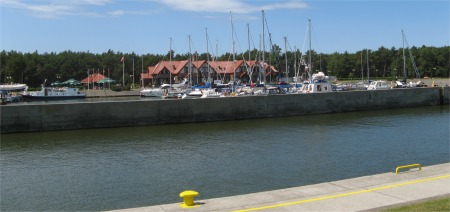 Leba Marina |
A short walk to town brought me to a site, whose owner understood a little German but no English. He couldn't help. A short distance away was another site whose owner spoke only Polish. I drew a picture of a Calor Gas bottle, and the chap had obviously never seen one before; again a dead duck.
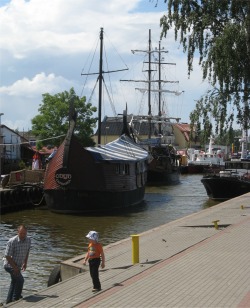 Tourist Galleons on Kanal Chelst |
They recounted their journeys across Europe to me. Traveling for three years now, they hoped to get back to Scotland soon to spend a month or two there before heading off to the Greek Islands. We wished each other well on our adventures and said our farewells.
I walked right through the town, which could best be described as resembling a typical seafront that could be found at any British seaside town, but in two dimensions. It was just a tourist trap, with quick food establishments, souvenir shops, cafes, bars, restaurants and amusement arcades. The complex was fairly new, with many low rise holiday apartments sitting behind the tourist traps.
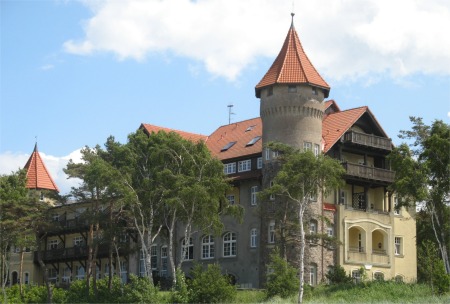 "Kurhaus" Sanatorium - Neptun |
A pleasant amble through dunes and woods brought me back into town, where I visited yet another couple of campsites that claimed on their signs that German and English was spoken. Broken German was the best they could manage. The feedback was grim, and I thought a better option might be to consult the tourist information office when it opened in the morning.
I headed back to the marina, passing convoys of young children. There must have been camps run for the kids in the resort. I rounded off the trek by getting completely soaked in a torrential thunderstorm. Boarding the boat, I found Alan engaged in conversation with one of the German skippers about stopping off options in Germany. Later on in the evening we took a stroll to the nearby beach, and then retired to the clubhouse at the marina for a couple of beers and food.
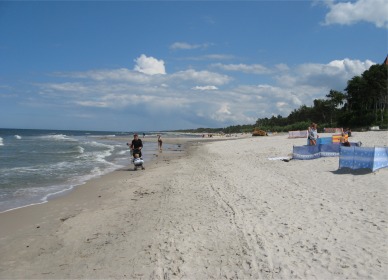 East Beach |
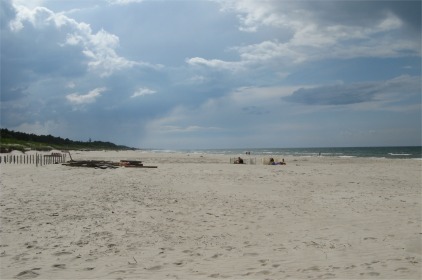 West Beach |
Over our meal, Alan raised the issue of how our voyage was going to unfold over the latter stages. We would be stuck here for a few days until the wind changed to a more favourable direction. Then, all being well we could proceed either along the coast to Germany, where we would be able to pick up gas, or we could head to the Danish island of Bornholm, which would be an ideal jumping off point to sail up through the Kattegat and Skagerrak, and then out into the North Sea. Skagerrak was notorious for its gales, and I sensed Alan relished the challenge of taking on this new route. However, our main obstacle would always be getting back across the North Sea against prevailing winds, which would be a real challenge and decidably unpleasant in Kiitaja. Knowing how I had suffered coming down to Poland from Klaipeda, he asked me whether I wanted to stick it out, or get a flight home. Personally I wanted to see the whole trip through, even if it meant some suffering on the final straight. I mentioned that as long as we had plenty of Sturgeron, I could bear it, though cooking in heavy seas may be ruled out. The bottom line came down to sailing out to the North Sea via the Kiel Canal, or from the tip of Denmark. The latter would involve a much longer journey time across the North Sea. Alan wanted to get back home by mid July at the latest, so the Kiel Canal route was favourite. We decided to check the weather again in a couple of days since forecasts were only really valid for that length of time.
20th June
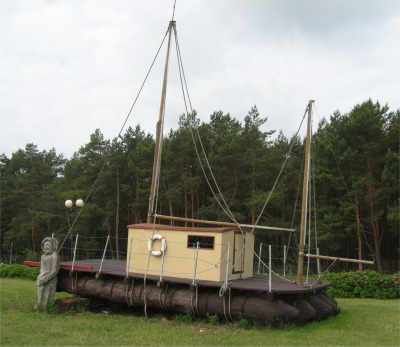 Replica of a Raft Used by Poles to Escape to Gottland, Sweden |
The rocket museum was open, and we were given a map to show where it was located out of town. The transport to Gdansk would involve a change at Lebork. Since trains to Lebork from Leba only ran from late June to August, we would need to take a one hour bus ride to Lebork, and then a two hour train trip to Gdansk. We obtained times for buses and trains. As for gas, we were pointed to a garage.
We hiked to the garage on the outskirts of town. It did indeed sell gas, LPG, but the connections were different to UK fittings, and the garage had no adaptors.
Giving that up, we decided to head to the Missile Launching Site Museum at Wyrzutnia, near Rabka. It lay 6km west of Leba, and we could reach it via a couple of melex taxis, effectively little carriages pulled along by glorified golf buggies. We learned later that it was the Poles who had invented the golf buggy. The ride was a pleasure in itself, winding along a narrow road through birch forest, with glimpses through the trees to Jezioro Lebsko lake on one side, and distant sand dunes on the other. The whole area was part of the Slowinski National Park, a beautiful natural contrast to the tourist glitz of Leba.
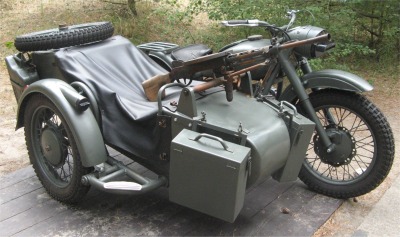 German Motorbike plus Sidecar |
The site had now been converted to a museum featuring photos, film footage and artifacts from the early 40s to the 70s. Sadly, all of the exhibits were described in Polish with just 10% also bearing German text. English was not available. I assumed the swallows, which were nesting in the underground launch bunker, couldn't have cared less about the language situation.
I was keen to talk with a Polish person who could speak half decent English, in order to glean a little more about the country. On our meander around the museum, I had spotted a young fellow giving a guided tour to a group of Poles. In the faintest glimmer that he might speak a word or two of English, I approached him and asked him if he could speak English. "Yes, of course I can, I learnt all my English from the Beatles and Pink Floyd".
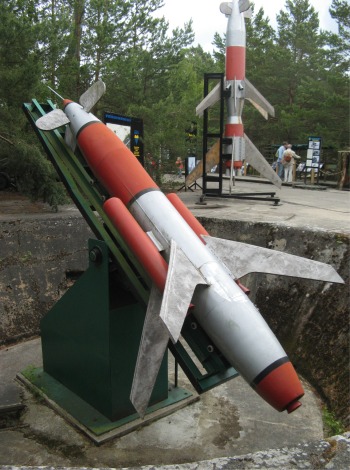 Polish Metrological Rockets |
The young fellow hailed from Leba, but during term time he studied law in Gdansk. He had learned English at school; most young folk learn English. This surprised me since it seemed to me that not many young Poles were willing to speak English, but there again how many youngsters have learnt a foreign language in Britain but were terrified of speaking to a foreigner. Apart from his lessons at school, he was a passionate and knowledgeable follower of British pop music dating from the 60s, in particular the Beatles. Combined with this, he watched on Utube programs such as QI and Top Gear, and thus acquired a remarkable command of English.
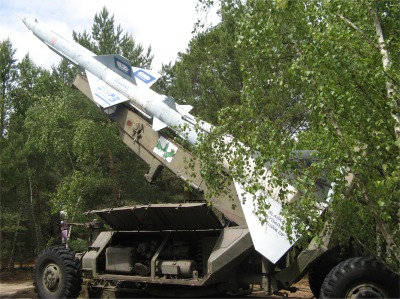 Russian Missile |
When the Russians occupied the country after the war, things did not get any better, and as in the other Baltic states, collectivisation of farms took place, as well as the state control of industry. For the first five years after the war ended, nearly all Polish coal was taken by the Russians, who never paid a rouble for it. The industrial output also found its way back to Russia, but since the state controlled almost everything, what could the Poles do? Many fled in rafts or rowing boats to Sweden. Salaries were low, but there was nothing in the shops to buy anyway. He had never experienced any of this himself, but the knowledge was handed down by his parents and grandparents.
Today, like the rest of Europe, the economy had slumped, and the once famous shipyards were a shadow of their former selves. The Poles continued to loathe their neighbouring countries. The country was forward looking and wanted to reach a position of a leading economy again, but there was a lingering smell of Russian corruption in the air.
He gave us some tips on Gdansk, and we parted, thanking him for the knowledge he had shared with us.
We returned to the boat and gave it a decent service: new primary and secondary fuel filters, new oil filter and oil change, coolant flush and change, and gearbox oil check. All in all, quite a rewarding day.
